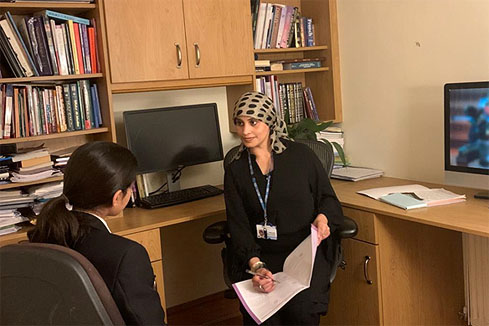
How I got into the role
After my first degree, I embarked a career in academia as a research associate at Hester Adrian research Centre, University of Manchester. My research involved interviewing people with learning disabilities, their families and carers. Listening to the experiences and lives of people was so powerful that it changed my course of career from academia to becoming a clinician. It allowed me to see the difference I could make directly to the lives of people with learning disability by working as a clinician.
I went on to complete a further 3-year postgraduate doctoral of clinical psychology training programme at Lancaster University. Although the training allowed me to work with a range of client/patient groups across the ages, my passion for working with people with learning disability remained. I have worked in NHS learning disability services for over 20 years now, supporting people with learning disability experiencing psychological, emotional and behavioural issues. Starting off as a newly qualified clinical psychologist I worked for a number of years in NHS learning disability services, building on my clinical, therapeutic and supervisory skills. I undertook further post-doctoral training in Neuropsychology, Eye Movement Desensitisation and Reprocessing, Narrative, Systemic and Cognitive Behavioural Therapy approaches all with the aim of applying this into my clinical work with people with learning disabilities.
The breadth and range of clinical, service development, advocacy and research work I undertook allowed me to progress and take on more clinical responsibility and senior leadership roles. I was able to see the importance of not only providing direct 1:1 clinical work with people with learning disabilities, their carers and families but also realise how I can contribute towards achieving bigger and better outcomes to the lives of people with learning disabilities by working to help improve the systems in which people with learning disabilities found themselves in.
What I do
My current work as a consultant clinical psychologist, strategic and clinical lead for learning disabilities psychological services involves working at many levels to help improve the lives people with learning disabilities we serve. This is implemented through providing support to staff and teams to help better assess, formulate and develop sustainable intervention plans to some of the most psychologically, emotionally and behaviourally complex and challenged client groups; develop new and effective care pathways, continually monitor and evaluate the work we do; develop new services where there may be a service deficit and ensure the service continues to provide up to date and evidenced based care.
My work at the different levels includes working directly to support people with learning disabilities presenting with complex psychological, behavioural and emotional needs , working indirectly with staff, cares and families, supporting teams through reflective practice; providing supervision, consultancy, advise and training. I ensure that our services are utilised in the best possible way to help support people with learning disabilities using evidenced based practice. A significant part of my job involves providing professional, strategic and clinical leadership. I help steer the delivery of services for people with learning disabilities by working closely with staff, teams, other heads of service, senior managers, and commissioners. I am also involved at a national level in contributing towards my professional and regulatory bodies such as the Health and Care Professional Council and the BPS- Faculty of Intellectual Disabilities. I work closely with colleagues in the development & implementation of national and local guidance. I am an active researcher and continually undertake research and development activities in close collaboration with colleagues at several university sites. Working at this level enables me to continually assess, evaluate, expand and remodel the delivery of service we provide to ensure we continually provide the highest quality service for some of the most vulnerable members of our society. In doing so, it allows me to see how we can best meet the psychological & emotional needs of the of people with learning disabilities we support.
The best bits
The best bits about the job is the opportunities it offers me to help utilise a broad range of my academic, clinical and professional skills. These skills are used to tailor the needs of the service and clients I support. Just as every client we see is different in the same way no two working days are the same.
The opportunities the role allows me to make a difference to the day to day lives of people with learning disabilities at so many levels is probably the best part of my role as a consultant clinical psychologist. This can be working at a systems level, at an organisational level, staff and team level to working with carers/families and of course most significantly at a direct clinical level with service users.
I love to see the impact our work has on the lives of people with learning disabilities we support. We develop and deliver sustained psychologically minded/informed services in collaboration with staff teams, families and carers. The shifts in mind-sets made in how families, carers, staff and teams view people with learning disabilities and the ability they have to make a difference to enhancing the psychological and emotional wellbeing of people with learning disabilities is really powerful. This level of working can enhance the wellbeing of not just a few people with learning disabilities but whole populations of people with learning disabilities we serve. This work ultimately means supporting clients in their own homes and communities to reduce unnecessary hospital admissions; helping clients cope better with complex histories of trauma , abuse and loss, plan better care for older adults with learning disabilities and dementia; help understand and make sense of people with learning disabilities presenting with severe behavioural challenges and putting in place intervention strategies to manage and ultimately reduce this.
I love the fact that this role allows me to utilise my clinical, therapeutic, research and academic skills to help deliver services that have such significant impact on improving the day to day lives of people with learning disabilities their carers and families.